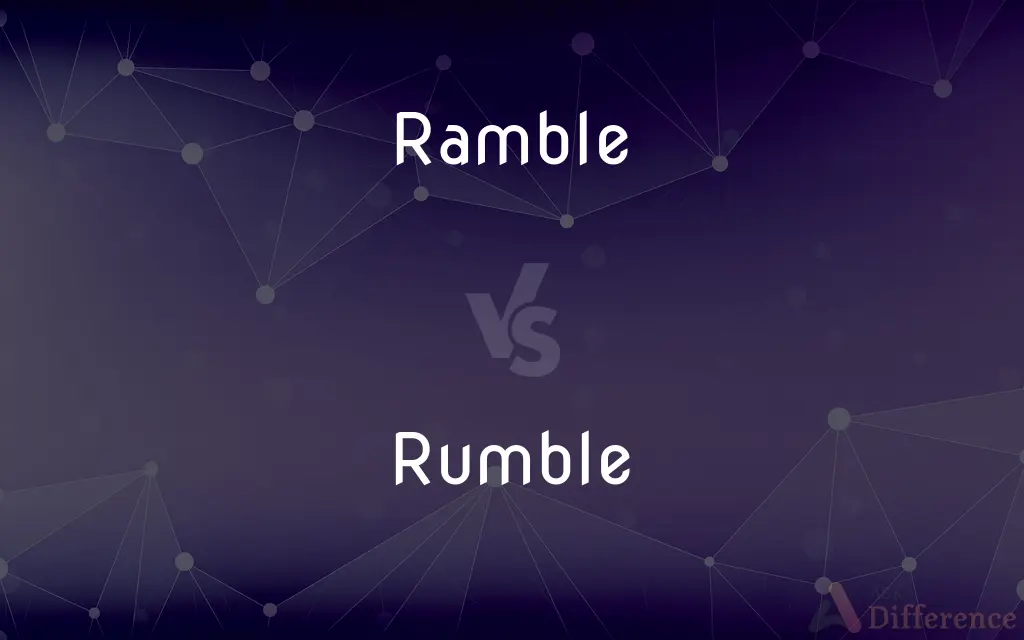Ramble vs. Rumble — What's the Difference?
Edited by Tayyaba Rehman — By Urooj Arif — Updated on March 18, 2024
Ramble refers to walking or speaking aimlessly, whereas rumble indicates a deep, rolling sound or a fight.

Difference Between Ramble and Rumble
Table of Contents
ADVERTISEMENT
Key Differences
Ramble embodies the idea of moving or speaking without a specific direction or purpose, often associated with leisurely walks through the countryside or conversations that meander through various topics without a clear point. This term captures a sense of wandering, either physically or mentally, allowing for exploration and the discovery of thoughts and places at a relaxed pace. On the other hand, rumble conveys a sense of auditory depth and physical confrontation. It refers to a low, continuous, and often distant sound, like that of thunder or an approaching storm, as well as to informal or spontaneous fights, typically without rules and in public spaces.
When one rambles, the focus is on the journey rather than the destination, whether that journey is taken with one's feet or one's words. The act of rambling allows for spontaneity and the organic development of ideas or paths. Conversely, a rumble, in its auditory sense, suggests something ominous or foreboding, creating an atmosphere of tension or the anticipation of something significant about to happen. In the context of a physical altercation, it implies a sudden and chaotic conflict, often with a group dynamic.
Ramble can also imply a certain charm or quaintness, evoking images of pastoral landscapes or engaging storytellers whose narratives sprawl delightfully across various anecdotes and reflections. In contrast, rumble, when used to describe a fight, has a grittier connotation, suggesting a raw, unrefined, and often violent encounter. The auditory sense of rumble, with its association with natural phenomena or the sound of machinery, conveys power and resonance, capable of invoking awe or apprehension.
The distinction between these terms extends to their usage and implications. Rambling, whether physically wandering or engaging in lengthy, digressive conversation, is generally a benign and often enjoyable activity. Meanwhile, the concept of a rumble, whether as a sound or an action, carries a more intense and sometimes ominous or confrontational tone. A rumble's auditory presence can fill a space with a sense of depth and vibration, while its physical occurrence interrupts the normal flow of social interactions with its spontaneity and potential for disruption.
Ramble and rumble navigate through contrasting landscapes of human experience. One is an unhurried exploration of thoughts, words, and terrains, marked by a leisurely or reflective pace. The other encapsulates the intensity of sound and conflict, resonating with power or unfolding in unforeseen contention.
ADVERTISEMENT
Comparison Chart
Definition
Walking or speaking aimlessly.
A deep, rolling sound or a fight.
Connotation
Leisurely, exploratory, and often positive.
Ominous, confrontational, and can be negative.
Context
Can refer to physical wandering or conversational style.
Associated with sounds (like thunder) or informal fights.
Implications
Implies a relaxed exploration without a fixed goal.
Suggests tension, power, or spontaneous conflict.
Usage in Sentences
"They enjoyed a leisurely ramble through the countryside."
"The distant rumble of thunder warned of the approaching storm."
Compare with Definitions
Ramble
A meandering path or journey.
The ramble through the old city's streets revealed hidden gems.
Rumble
A low, continuous, deep sound.
The rumble of the train could be felt through the ground as it approached.
Ramble
Engaging in aimless discourse.
The conversation rambled on into the early hours, covering myriad topics.
Rumble
An informal fight or brawl.
A rumble broke out between rival groups in the alley.
Ramble
Speaking or writing at length in a confused or inconsequential way.
He tends to ramble during his lectures, but his insights are fascinating.
Rumble
The sound of thunder in the distance.
The soft rumble of thunder in the distance promised rain.
Ramble
To walk with no particular direction.
They decided to ramble through the forest, enjoying the beauty of nature.
Rumble
Indicating the presence of something powerful or significant.
The rumble of the engines signaled the race was about to begin.
Ramble
A leisurely excursion in the countryside.
Their weekend rambles became a cherished ritual.
Rumble
The sensation of something moving or shaking.
The rumble of the earthquake woke everyone in the house.
Ramble
To walk casually or leisurely
Rambled over to the neighbor's house.
Rumble
To make a deep, long, rolling sound.
Ramble
To move about aimlessly
Rambled around the park for an hour.
Rambled around the southwest.
Rumble
To move or proceed with a deep, long, rolling sound.
Ramble
To follow an irregularly winding course of motion or growth
Vines rambled over the fence.
Rumble
(Slang) To engage in a gang fight.
Ramble
To speak or write at length and with many digressions
Rambled on about his childhood.
Rumble
To utter with a deep, long, rolling sound.
Ramble
To move about aimlessly through or over
Rambled the back streets of town.
Rumble
To polish or mix (metal parts) in a tumbling box.
Ramble
A leisurely, sometimes lengthy walk.
Rumble
A deep, long, rolling sound.
Ramble
A leisurely stroll; a recreational walk in the countryside.
Rumble
A tumbling box.
Ramble
A rambling; an instance of someone talking at length without direction.
Rumble
A luggage compartment or servant's seat in the rear of a carriage.
Ramble
(mining) A bed of shale over the seam of coal.
Rumble
Pervasive, widespread expression of unrest or dissatisfaction.
Ramble
A section of woodland suitable for leisurely walking.
Rumble
A gang fight.
Ramble
To move about aimlessly, or on a winding course
Rumble
A low, heavy, continuous sound, such as that of thunder or a hungry stomach.
The rumble from passing trucks made it hard to sleep at night.
Ramble
To walk for pleasure; to amble or saunter.
Rumble
(slang) A street fight or brawl.
Ramble
To lead the life of a vagabond or itinerant; to move about with no fixed place of address.
Rumble
A rotating cask or box in which small articles are smoothed or polished by friction against each other.
Ramble
To talk or write incessantly, unclearly, or incoherently, with many digressions.
Francine has a tendency to ramble when it gets to be late in the evening.
Rumble
(dated) A seat for servants, behind the body of a carriage.
Ramble
To follow a winding path or course.
The river rambled through the mountains.
Rumble
(intransitive) To make a low, heavy, continuous sound.
If I don't eat, my stomach will rumble.
I could hear the thunder rumbling in the distance.
Ramble
To walk, ride, or sail, from place to place, without any determinate object in view; to roam carelessly or irregularly; to rove; to wander; as, to ramble about the city; to ramble over the world.
He that is at liberty to ramble in perfect darkness, what is his liberty better than if driven up and down as a bubble by the wind?
Rumble
(transitive) To discover deceitful or underhanded behaviour.
The police is going to rumble your hideout.
Ramble
To talk or write in a discursive, aimless way.
Rumble
(intransitive) To move while making a rumbling noise.
The truck rumbled over the rough road.
Ramble
To extend or grow at random.
Rumble
To fight; to brawl.
Ramble
A going or moving from place to place without any determinate business or object; an excursion or stroll merely for recreation.
Coming home, after a short Christmas ramble.
Rumble
To provide haptic feedback by vibrating.
Ramble
A bed of shale over the seam.
Rumble
(transitive) To cause to pass through a rumble, or polishing machine.
Ramble
A section of woods suitable for leisurely walking.
Rumble
(obsolete) To murmur; to ripple.
Ramble
A type of dance; as, the Muskrat ramble.
Rumble
An onomatopoeia describing a rumbling noise
Ramble
A leisurely walk (usually in some public place)
Rumble
To make a low, heavy, continued sound; as, the thunder rumbles at a distance.
In the mean while the skies 'gan rumble sore.
The people cried and rombled up and down.
Ramble
Continue talking or writing in a desultory manner;
This novel rambles on and jogs
Rumble
To murmur; to ripple.
To rumble gently down with murmur soft.
Ramble
Move about aimlessly or without any destination, often in search of food or employment;
The gypsies roamed the woods
Roving vagabonds
The wandering Jew
The cattle roam across the prairie
The laborers drift from one town to the next
They rolled from town to town
Rumble
A noisy report; rumor.
Delighting ever in rumble that is new.
Rumble
A low, heavy, continuous sound like that made by heavy wagons or the reverberation of thunder; a confused noise; as, the rumble of a railroad train.
Clamor and rumble, and ringing and clatter.
Merged in the rumble of awakening day.
Rumble
A seat for servants, behind the body of a carriage.
Kit, well wrapped, . . . was in the rumble behind.
Rumble
A rotating cask or box in which small articles are smoothed or polished by friction against each other.
Rumble
A loud low dull continuous noise;
They heard the rumbling of thunder
Rumble
A servant's seat (or luggage compartment) in the rear of a carriage
Rumble
A fight between rival gangs of adolescents
Rumble
Make a low noise;
Rumbling thunder
Rumble
To utter or emit low dull rumbling sounds;
He grumbled a rude response
Stones grumbled down the cliff
Common Curiosities
Can ramble have a positive meaning?
Yes, ramble often has a positive connotation, suggesting leisurely exploration or the pleasure of wandering physically or mentally.
Is a rumble always related to fights?
No, while rumble can refer to informal fights, it also describes deep, continuous sounds like those of thunder or heavy machinery.
What is the significance of a rumble in nature?
In nature, a rumble often serves as a warning or indicator of natural events like storms or volcanic activity, reflecting the power and scale of these phenomena.
What causes a rumble sound?
A rumble sound can be caused by various phenomena, including thunder, earthquakes, heavy machinery, or any large object in motion producing a deep, resonant sound.
What is the difference between a ramble and a hike?
A hike typically implies a more strenuous, purposeful walk often on trails or in nature, while a ramble suggests a leisurely, aimless walk with no particular destination.
How can one enjoy a ramble?
Enjoying a ramble involves embracing the journey without concern for the destination, often exploring nature or allowing conversations to unfold naturally.
Is it possible to ramble in a conversation intentionally?
Yes, one might intentionally ramble in a conversation to explore ideas freely, to entertain, or to engage in a relaxed, informal dialogue.
Can the sound of a rumble be pleasant?
While often associated with ominous or powerful phenomena, the sound of a rumble can be pleasant or comforting to some, as with distant thunder or the sound of waves.
Can rumble be used metaphorically?
Yes, rumble can be used metaphorically to describe a feeling of unrest, the anticipation of significant events, or the presence of underlying tension.
How can rumble be distinguished from other sounds?
Rumble is distinguished by its low, deep, and continuous quality, often felt as much as heard, and is associated with large-scale or powerful sources.
What does it mean when someone is described as a rambler?
Being described as a rambler suggests a person often engages in aimless or prolonged talking or enjoys wandering without a specific route or goal.
Do all cultures perceive the concept of rambling positively?
Cultural perceptions of rambling can vary, with some cultures valuing purpose and direction over aimless wandering, both physically and in conversation.
Share Your Discovery

Previous Comparison
Dispatched vs. Shipped
Next Comparison
Amalgam vs. SynthesisAuthor Spotlight
Written by
Urooj ArifUrooj is a skilled content writer at Ask Difference, known for her exceptional ability to simplify complex topics into engaging and informative content. With a passion for research and a flair for clear, concise writing, she consistently delivers articles that resonate with our diverse audience.
Edited by
Tayyaba RehmanTayyaba Rehman is a distinguished writer, currently serving as a primary contributor to askdifference.com. As a researcher in semantics and etymology, Tayyaba's passion for the complexity of languages and their distinctions has found a perfect home on the platform. Tayyaba delves into the intricacies of language, distinguishing between commonly confused words and phrases, thereby providing clarity for readers worldwide.
















































